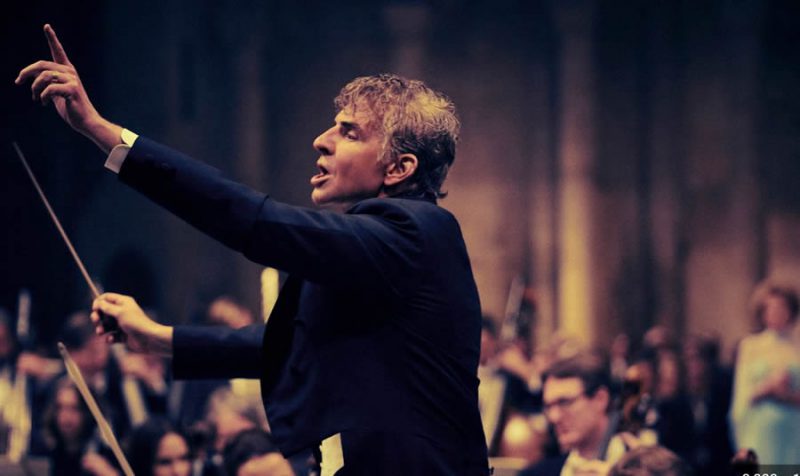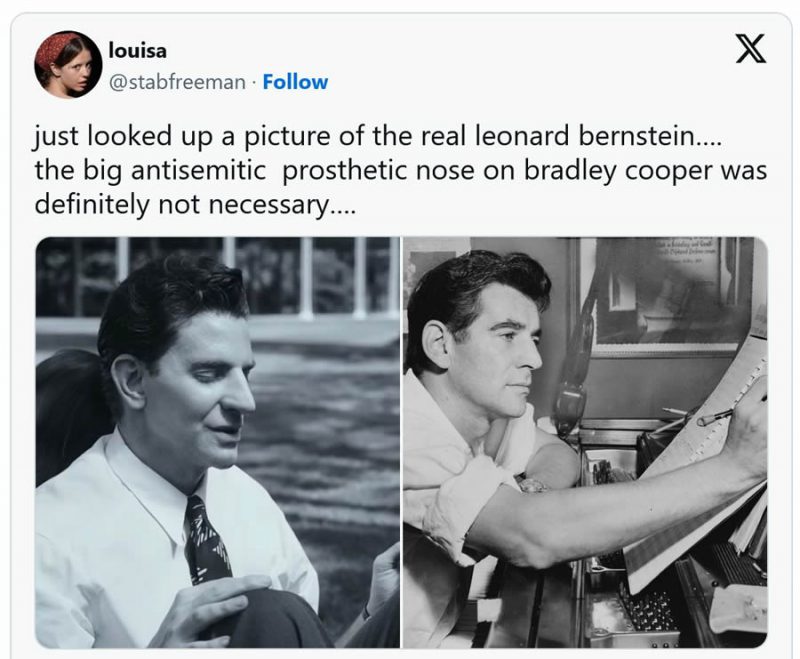Every year for the past several years, this A+/A list actor convinces himself that he will be not only nominated for an Oscar, but win.
He worries about it more than Jessica Chastain worries about her EGOT chances.
Every year though, something derails him, and this year it is looking as if it will happen again.
He was convinced he was going to win this year.
Bradley Cooper
Maestro
Why all the chatter about Bradley Cooper’s prosthetic nose in ‘Maestro’?
In taking on the role of a Jewish conductor, Bradley Cooper, who isn’t Jewish himself, has opted for a prosthetic nose. However, this choice has sparked criticism from some quarters, with concerns raised that it may perpetuate anti-Semitic stereotypes.
This isn’t the first time actors have used prosthetic noses to portray Jewish characters, harking back to iconic roles like Shylock in ‘The Merchant of Venice’ and Fagin in ‘Oliver Twist’. Unfortunately, these depictions often leaned into harmful stereotypes, such as the notion that Jews have larger noses—a trope infamously exploited in Nazi propaganda.
The discussion surrounding Cooper’s prosthetic nose delves into a deeper conversation about the responsibility of actors in avoiding perpetuating harmful stereotypes, especially in the context of historical misrepresentations.
The early reviews for ‘Maestro’ make it an instant Oscar contender
If early reviews from the Venice Film Festival are any indication, Bradley Cooper may have created a masterpiece with “Maestro,” his biopic of famed composer Leonard Bernstein.
“Maestro,” which was partially filmed in Western Mass. at Tanglewood in 2022, chronicles the complex, decades-long relationship between Bernstein (Cooper) and activist Felicia Montealegre Cohn Bernstein (Carey Mulligan, “Drive”).
But more often than not, they’re a decent enough barometer. And with “Maestro” earning a 93 percent freshness rating on Rotten Tomatoes following its festival debut, the film is on the right track for Oscar nominations.
Here’s what some of the top film critics are saying about “Maestro.”
Variety’s Owen Gleiberman wrote that the controversy over Cooper’s prosthetic nose was misplaced, and that the actor’s eyes are the real draw.
Cooper, as an actor, has always had a preternatural gleam. In “Maestro,” those eyes burn with delight, as he infuses Lenny with a giddy abandon that makes him a spectacle unto himself. He’s got so much life force he expects the whole world to revolve around it.
IndieWire’s Ryan Lattanzio gave “Maestro” a B-, praising the lead performances but ultimately finding it to be a somewhat straightforward biopic.
As a study of how the Bernsteins’ near-three-decade marriage endured Lenny’s gayness and genius, “Maestro” succeeds off the chemistry between Mulligan and Cooper, but the film often looks and feels too fussed-over, almost too precisely manicured, to ever erase its own parameters as a linear biopic.
David Rooney of The Hollywood Reporter said that “Maestro” represented “a considerable leap in terms of accomplishment” for Cooper, from “A Star Is Born,” a movie he also loved.
Amplifying its force with thrilling use of the subject’s music, this is a layered examination of a relationship that might be grossly over-simplified today as that of a closeted gay man and his “beard.” But Cooper and co-screenwriter Josh Singer dig deeper to depict a unique union, fraught with conflicts yet unbreakable — even when it’s broken.
New York Magazine’s Bilge Ebiri praised Mulligan and called Cooper a “director of vision,” but found his performance lacking.
As Bernstein, Cooper’s performance is a masterful reconstruction, but it remains a reconstruction, earthbound and cool to the touch. […] It feels throughout like we’re watching a TV interview with Bernstein, like he knows the camera is on him. There are almost no unguarded, intimate moments. – Source


